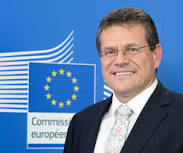EC defends Opal Capacity Decision
The EU’s most senior energy official Maros Sefcovic disclosed the thinking behind the decision to lift the conditional ban on the other half of the capacity of the Opal line when addressing the Tatra Summit organised by Slovakia’s Globsec think-tank October 28, meaning Gazprom may now use up to 80% of the capacity.
He said the aim was to ensure supply diversity for the Czech Republic – and that it would not detract from the EC’s drive to ensure the continuation of gas supplies from Russia across Ukraine once Gazprom’s transit arrangements with Ukraine come to an end in 2019.
The EC’s Vice President for Energy Union began by saying that when the first Nord Stream line was being built six years ago, the EC offered Gazprom 100% exemption of Opal, provided it would agree to a gas release programme of 3bn m³/yr. However, he said, “They didn’t do it.” As a result, a tough regime was imposed under which Gazprom could have an exemption for just 50% but with the other 50% subject to continued regulation.
Maros Sefcovic

(Credit: EC)
In May 2016, the German network regulator Bundesnetzagentur (BNA) notified the EC that it was recommending that the remaining half be made available to any prospective supplier, including Gazprom. Once the BNA had made its recommendation, Sefcovic continued, the EC had three options, all with legal consequences.
First, he said, “We could not act, we could not react; (then), the regime the German regulator proposed would be automatically deemed adopted;
“Second, we could refuse, but on very shaky legal grounds which we are pretty sure would be challenged successfully in the courts;
“Or we could propose a better solution, and this is exactly what we did, and we proposed a solution which is opening for the first time this pipeline to third parties, so that for the first time 20% would be open to third parties.”
What this meant, he added, was that if 20% of the gas were to come from third parties, then this would amount to 60% of Czech consumption… Under the circumstances, we adopted the best possible solution.”
He then added that he had heard press reports that this decision was directly to the detriment of the Ukraine transit route and to Poland’s Yamal transit route.
John Roberts
For more, please see the forthcoming issue of Natural Gas World, published November 2


